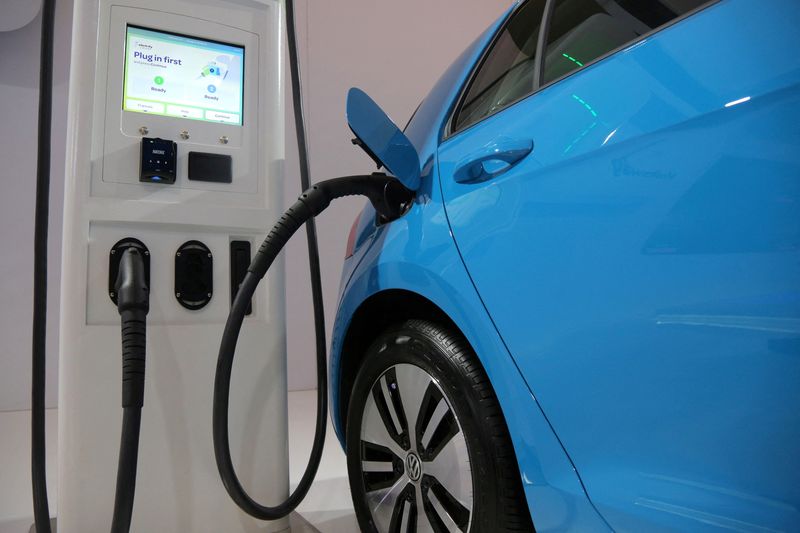By Rod Nickel
WINNIPEG, Manitoba (Reuters) - Canada needs to shift gears on its strategy of building electric vehicle (EV) charging stations across the country, advocacy groups and government officials say, but they are trying to steer Prime Minister Justin Trudeau's Liberal government down different roads.
Trudeau's rollout strategy is focused on building EV ports in populous public areas and multi-family residential buildings, which experts warn may not be enough to rapidly increase EV adoption and help meet the government's ambitious climate goals.
Canada's best opportunity to rev up its charging network build-out is to focus on single-family homes, where more than 80% of charging occurs, some advocacy groups say. The country's Office of the Auditor General and other groups argue, however, that the world's second-largest country by area should do more in remote and low-income communities, a task the private sector is unlikely to take on.
Trudeau's government plans to phase out sales of new light-duty combustion vehicles by 2035, part of Canada's broader target of curbing greenhouse gas emissions from 2005 levels by at least 40% by 2030, a goal it is likely to miss. Transportation accounts for 22% of Canada's greenhouse gas emissions.
The country's sprawling national highway system spans 38,049 km (23,643 miles) and cold winters reduce battery efficiency, creating additional challenges for building an effective charging network.
The government-controlled Canada Infrastructure Bank agreed last week to loan up to C$210 million ($153.08 million) to fuel retailer Parkland Corp to help spur expansion of its existing EV charging network in British Columbia, a Western Canadian province where EV adoption is high.
The bank's financing raised its total charging commitments to C$445 million. Parkland, nevertheless, said it is looking for further outside investment to build out its charging network.
Trudeau's government should make it cheaper for owners of older homes to upgrade their electrical systems, work that costs C$2,000-C$3,000, said Daniel Breton, the CEO of Electric Mobility Canada, an advocacy group. Breton also is co-chair of a government working group on charging infrastructure.
"People seem to forget that the backbone of the infrastructure is not public charging, it's home charging," Breton said.
'SERIOUS CHALLENGE'
Breton said that 30% of the cost of installing a home EV charging station in the U.S. is covered by a federal tax credit, while California residents can receive rebates for upgrading charging stations and electric panels.
Most Canadians drive short distances to work, meaning that public charging is mainly necessary for longer-haul travellers, Breton said.
A Nov. 7 report from Canada's Auditor General said Natural Resources Canada, the main government agency providing financial support for charging stations, is on track to meet an interim target of installing 33,500 ports nationally by 2026. Canada had 19 EVs per public charging point in 2022, while the number was 24 in the U.S., according to the Paris-based International Energy Agency.
Canada is spending more than its neighbor on EV chargers on a per capita basis, according to calculations from the Clean Energy Canada program at Simon Fraser University in Vancouver, a rare example of Canada outpacing the U.S. in the transition to a future less reliant on fossil fuels.
Ottawa needs to expand its financial support to homeowners without sacrificing other areas, said Brian Kingston, the CEO of the Canadian Vehicle Manufacturers' Association and a co-chair of the government working group on charging infrastructure.
"It's a serious challenge for an older home," Kingston said.
The Office of the Auditor General reported that Canada had overwhelmingly funded charging ports in populous provinces and should do more to build charging stations in remote parts of the country.
Those areas and multi-unit buildings should be the government's top priorities for funding because they are the ones least likely to attract private investment, while many homeowners can afford the upgrades themselves, said Joanna Kyriazis, director of public affairs at Clean Energy Canada, which also has a role on the infrastructure charging government working group.
Natural Resources Canada said it is reviewing gaps in the country's charging infrastructure and seeking collaboration from the private sector and provincial governments to meet its goals.
Trudeau's government plans to subsidize 84,500 new charging stations by 2029, hoping to spur the private investment needed to expand the network to at least 442,000 public chargers by 2035.
($1 = 1.3718 Canadian dollars)
